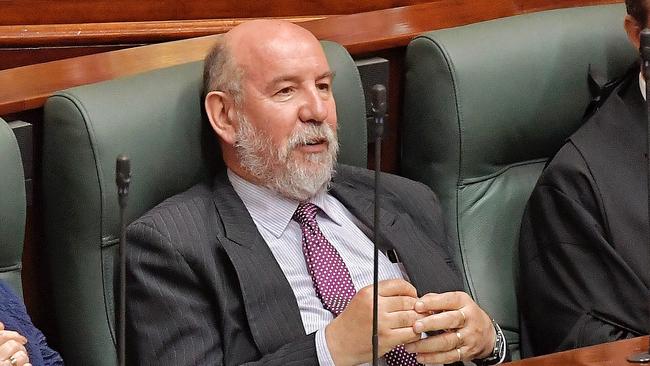Matt Johnston: No quick fix to Victorian MPs’ pay and allowances
How much do you think our politicians should be paid? It’s a tough question, writes Matt Johnston.

Opinion
Don't miss out on the headlines from Opinion. Followed categories will be added to My News.
HOW much do you think our politicians should be paid?
It’s a tough question.
Putting aside what MPs do in their community, which most of us wouldn’t have a clue about, should they be paid, say, the average wage, or a higher “attainable’’ wage?
While you consider that, let me lay out what they actually get.
Our bog-standard state MP gets a base salary of $148,210, plus an expense allowance of $11,857.
If you’re a parliamentary secretary, you get an extra $47,427.
Ministers, who can make big decisions that affect all our lives, get an extra $111,158.
Our Premier earns about $360,000, once you take into account expense allowances.
Back to the backbenchers. If you add in electorate allowances, expenses allowances, commercial travel allowances and other allowances, they get almost $210,000 a year — some of which may be spent on the electorate.
If they choose not to have a parliamentary car, they get up to $25,000.
Is that enough?
A report was handed to the parliament this week looking at an additional taxpayer-funded perk called the “second residence allowance”.
That report, by auditor PwC, came about because two Labor MPs had rorted the allowance meant for country MPs, and worth about $25,000 for most MPs living more than 80km from the Melbourne CBD.
Office holders like the Speaker and deputy speaker get $37,678 a year. Former Speaker Telmo Languiller told parliament he was living in Queenscliff — a long way from his western suburbs electorate of Tarneit — and had a second residence in Melbourne.
He later paid back $38,000 he had claimed, saying it didn’t meet “community expectations”.
Melton MP Don Nardella, who once grandstanded about MP standards, took home almost $175,000 while living in Ballarat and Ocean Grove.
The reason both MPs could “get away” with this — until journalists asked them what they had claimed — was because they said their “home base” was more than 80km from Melbourne.
It didn’t matter that their “home base” wasn’t in their seat, they just had to live more than 80km from Melbourne.
The Don refused to pay back money, and now sits as an independent who will forever be remembered as a rorter.
The reason the wider report into the allowance was commissioned was to check no other MPs were fiddling the system.
It was received on Wednesday and basically said the system was crap. Recommendations included getting rid of the allowance and replacing it with a reimbursement scheme for country MPs staying in Melbourne for parliamentary business.
Other recommendations include setting up an independent remuneration tribunal to decide on MP pay and allowances.
Much like in Canberra.
This is what the Andrews Government will push for in Victoria, and which may or may not happen depending on the will of Cabinet and parliament.
In 2012, a change to this system in Canberra saw a raft of rortable travel allowances dumped, but gifted federal MPs a pay rise of about $44,000.
In Victoria, the process will be impacted by the Don and Telmo show. As one senior source said, “there appears to be a reluctance to reform pay and conditions for fear that people will think the rorters are rorting again”.
In other words, do anything that even appears to give MPs more money — even if it means chucking out stupid allowances and paying a bigger base salary — and you could be crucified.
In Canberra, the Remuneration Tribunal this year suggested maintaining a base federal MP salary of $199,040.
The reason for that decision was based on economic and wage data, but also because of “pressures on the Budget, the economic outlook and limited wages movement both in the private and public sector taken together with a period of sustained low inflation”.
The gap between the rich and poor is growing wider.
Also, the earning capacity of people on a median wage of about $82,000, or who earn much less, is now staggeringly different to the earning capacity of some high earners in private companies.
Many people comfortably sitting in high-paid jobs won’t go near public life for a range of reasons, but the pay cut they would have to take influences their decision-making.
The majority of people who are paid less than politicians would probably tell them to go jump if the mere suggestion was raised, even if they aspired to earn as much as one of those politicians one day.
So which way will our state MPs, who rely on the vote of the many, lean towards?
My guess is they won’t fix the real problems and will sweep them under the carpet for another day.
Matt Johnston is state politics editor



